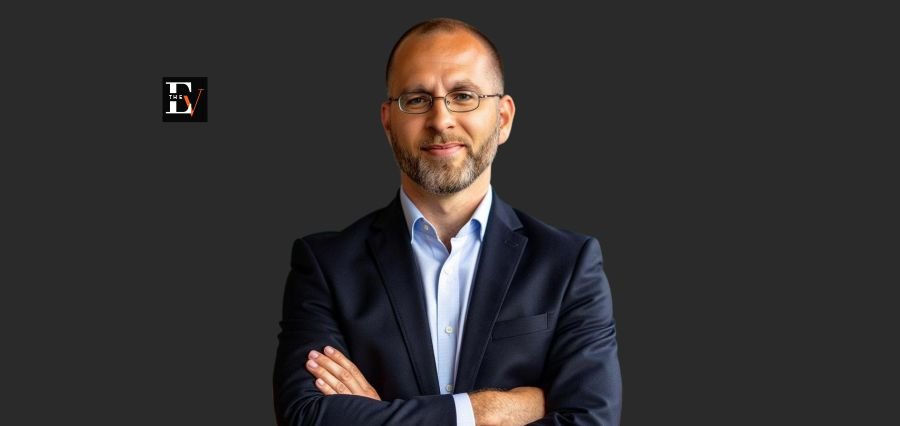History knows instances when the world of work requires a different type of leader, one that is capable of looking beyond performance charts and profit margins, one that realizes that there is a human heart behind every organization. That is exactly the case with Dr Jonathan H. (Jon) Westover.
In classrooms, boardrooms, and all around the world, when discussing the future of work, Westover has established a career around a single fact, namely, leadership that starts with humanity. He has traveled decades in connecting the disparity between research and practical application and assisting the organization in recognizing its people, not as a resource, but as complete individuals, capable of being creative, empathetic, and transformative.
Westover is not a denominative person; he is a purpose-driven professor, consultant, author, and global thought leader, the Founder and CEO of Human Capital Innovations (HCI). He is reinventing what leadership can be like when data meets dignity through his work.
Seeing People, Not Positions
When Westover talks about leadership, his words carry both conviction and compassion. He defines human-centered leadership as the act of seeing employees as whole people, not just job titles or line items on a balance sheet.
For him, it’s about creating spaces where individuals can thrive both professionally and personally. That means cultivating psychological safety, encouraging diverse perspectives, and aligning business goals with human needs.
The pandemic, he believes, was an awakening, a global reminder that work and life were never separate. “We began to see our colleagues as full human beings,” he notes, “as their kids ran across screens and their pets appeared in meetings.”
In his view, the leaders who will shape the future are those who master what he calls relational intelligence, the ability to build genuine connections rooted in empathy and trust. These, he insists, are not soft skills but essential ones. As automation and artificial intelligence reshape the workforce, Westover believes that the distinctly human traits, creativity, empathy, and ethical judgment, will become more valuable than ever.
Bridging Research and Reality
The seeds of Human Capital Innovations were planted long before the company was officially founded in 2007. Working across sectors, from LG Electronics in Korea to InterContinental Hotels, Westover noticed a persistent gap; organizations were chasing trends while overlooking evidence.
He saw leaders adopting the latest management fads, while valuable academic research sat buried in journals, inaccessible to those who needed it most. That disconnect inspired him to build a bridge between the two worlds, and HCI became that bridge.
In its early years, HCI focused on performance management consulting and training grounded in empirical research. What distinguished Westover’s approach was his ability to integrate comparative international perspectives, an awareness that culture, context, and humanity matter as much as metrics.
Over time, the company evolved into a multifaceted ecosystem. He launched HCI Academic Press to make research accessible, The HCI Podcast Network to connect global voices in leadership and innovation, and HCI Academy and Human Capital Leadership Review to bring academic rigor into practical learning environments.
“Our methods have diversified,” Westover often explains, “but our mission remains the same, to help organizations optimize workplace potential through evidence-based approaches that center human dignity.”
That consistency of purpose has become his signature: science and compassion, working side by side.
The Interconnected Life
Ask Westover how he manages to be a professor, entrepreneur, author, and consultant all at once, and he’ll tell you it’s not about balance, it’s about integration.
He doesn’t see these roles as separate silos, but as an interconnected ecosystem. His teaching provides a foundation for curiosity and dialogue; his consulting brings theory into contact with reality; his writing distills complexity into clarity. Each role fuels the others in what he describes as a “virtuous cycle of knowledge creation and application.”
In the classroom, whether at Western Governors University or Oxford, he tests ideas and learns from the diverse experiences of his students. In consulting, he sees how theory collides with practice, how even the best models must bend to real-world nuance. And through his books and publications, he gives structure to these insights, translating them into tools for leaders around the world.
For Westover, work is not about wearing multiple hats. It’s about cultivating one clear vision from different perspectives: advancing human potential through evidence-based organizational practice.
The Future of Work: Challenge and Change
Few understand the shifting landscape of work as deeply as Westover. His research and consulting have shown him that organizations today face five converging challenges that define the future: technological disruption, shifting workforce expectations, hybrid work, demographic diversity, and social accountability.
He speaks of these not as abstract trends but as human realities. Artificial intelligence and automation, for instance, are not simply about job loss but about job transformation. Leaders must design reskilling systems and cultures of continuous learning that help people adapt.
At the same time, younger generations are reshaping what work means, prioritizing flexibility, purpose, and well-being over hierarchy. Hybrid work, too, demands a reinvention of culture and communication. Leadership models built for physical offices struggle in distributed teams, where connection must be intentional, not incidental.
And as societies become more diverse, inclusion must move beyond compliance to become a structural principle. For Westover, the organizations that thrive will be those that treat inclusion not as a policy but as a design choice, a system that enables everyone to contribute fully.
“These are not incremental challenges,” he observes. “They demand a fundamental rethinking of leadership, organizational design, and human capital strategy.”
Education, Technology, and the Human Touch
As both an academic and an innovator, Westover has one foot in the world of education technology (EdTech), a sector he believes is redefining how we develop human potential.
He envisions a decade where competency-based learning replaces time-based models, where individuals advance based on mastery, not milestones. At Western Governors University, he has helped pioneer this approach, aligning learning outcomes with real-world performance.
AI-driven adaptive learning, he predicts, will enable personalized education at scale, tailoring learning to each individual’s strengths and prior knowledge. He also sees immense promise in virtual reality and immersive simulations, where future leaders can safely practice complex interpersonal skills like negotiation and crisis management.
But amid all this innovation, Westover offers a gentle warning: “Technology can amplify learning, but it should never replace the human connection that makes learning meaningful.”
For him, the best educational systems are not those that simply digitize classrooms, but those that humanize learning through empathy, adaptability, and purpose.
The Outcomes of Research
Westover’s global research on job satisfaction has revealed patterns that both surprise and challenge conventional wisdom.
He has found, for instance, that once basic fairness in compensation is met, money is rarely the main driver of satisfaction. Instead, relationships, autonomy, and purpose consistently rank higher.
Across cultures, the importance of autonomy is universal. Even in traditionally hierarchical societies, he discovered that having input into decisions significantly boosts satisfaction.
He was also intrigued by gender patterns; despite differences in experience, men and women often report similar overall satisfaction when other factors are equal. “It’s a reminder,” he notes, “that the deeper human needs at work, purpose, connection, fairness, cut across demographics.”
Perhaps most surprising to him is the persistent gap between research and practice: despite clear evidence of what works, many organizations continue outdated approaches. His life’s work, in many ways, is about closing that gap.
Building Cultures of Belonging
When asked how leaders can build authentic inclusion and trust in hybrid settings, Westover’s answer is both practical and profound.
He insists that inclusion must be intentionally designed, not left to chance. Remote and hybrid work demand deliberate systems to ensure every voice is heard, no matter where it originates.
He advocates for structured opportunities for connection, digital spaces where casual interactions once happened in hallways, and leadership practices that model vulnerability and trust.
In his words, “We must shift from presence-based management to outcome-based leadership.” In this new world, trust grows not from surveillance but from clarity, empathy, and shared purpose.
He often reminds leaders that flexibility can either empower or exclude, depending on how it’s implemented. True belonging, he argues, is not about policies but about perceptions, the daily experience of being seen, heard, and valued.
Investing in Purpose
As an advisor and investor, Westover brings the same philosophy to startups that he does to leadership: purpose must precede profit.
He looks for ventures that tackle substantive problems in education, healthcare, and technology, led by founders who combine expertise with empathy. He values learning agility, humility, and user-centered design over technical flash.
Above all, he seeks business models where financial success aligns directly with positive social outcomes. In sectors like EdTech and MedTech, he warns, ethical considerations cannot be an afterthought. “Responsible innovation,” he says, “begins with the courage to ask not just what we can build, but what we should build.”
Lessons from the World
Westover’s worldview is shaped not just by theory but by experience, lived and learned across continents. As a Fulbright Scholar in Belarus and Indonesia, he encountered leadership models far removed from Western norms.
In Asia, philosophies rooted in Confucian and Buddhist traditions taught him that leadership could be quiet yet profound, that authority could express itself through harmony rather than hierarchy. In Europe, he studied how historical and philosophical traditions shape organizational expectations.
From these experiences, he developed a contextually adaptive leadership framework, recognizing both universal human needs and culturally specific expressions. He calls it “contextual intelligence”, the ability to engage authentically with difference without losing one’s core identity.
True cultural adaptability, he believes, is not just behavioral but internal. It requires cognitive flexibility, emotional resilience, and a secure sense of self. These, he says, are the foundations of leadership in a global age.
The Human Equation
Through every chapter of his journey, as educator, researcher, entrepreneur, and leader, Jonathan H. Westover has held fast to one belief: that organizations are living systems powered by people, not processes.
His work continues to expand through HCI’s growing ecosystem, his academic contributions, and his voice in global leadership dialogues. But at its heart, his mission remains elegantly simple: to make work more human, and leadership more humane.
As the world rushes toward automation and data-driven decision-making, Westover stands as a reminder that no technology can replace trust, no algorithm can substitute empathy, and no innovation is complete without integrity.
“Human-centered leadership,” he says, “isn’t just a strategy, it’s a responsibility.”
And in that conviction lies both his purpose and his legacy: leading the human way.





